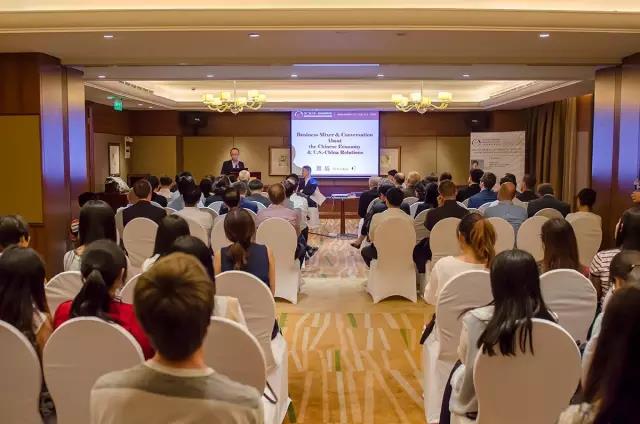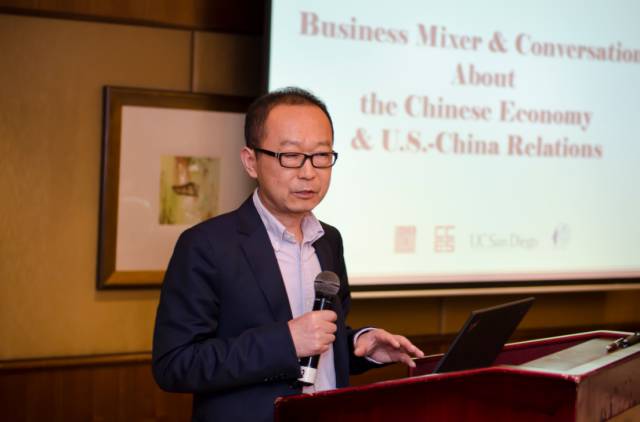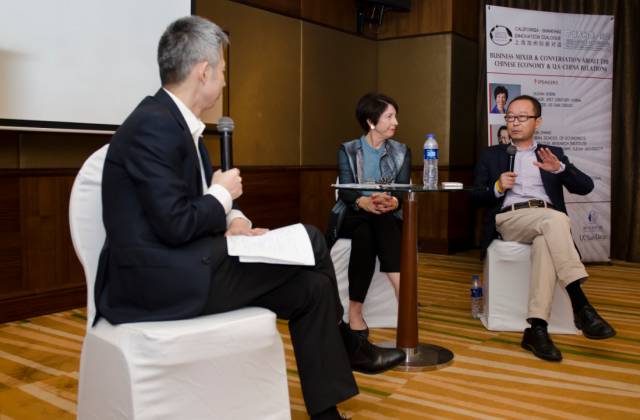Author: Release date:2016-10-26 14:11:41Source:发展研究院英文

On September 12-14, 2016, the Shanghai-California Innovation Dialogue was held at Fudan University in Shanghai, China. Susan Shirk, research professor at UC San Diego School of Global Policy and Strategy, and Zhang Jun, Professor of Economics at FudanUniversity, gave their perspectives on the future of US-China relations, with the theme of welfare and innovation.
Professor Zhang gave his take on why the rate of growth has slowed in China due to a shift in policy. In response to the 2008 global financial crisis, the Chinese government approved of a stimulus package which boosted aggregate demand but increased debt in local governments and the corporate sector. This constrained the ability to expand capacity, and thus the Chinese government has been reluctant to pass demand-side policies.
Why should government make a consensus to go to supply side?
Zhang believes that by shifting from demand side policies to the supply side policies, the Chinese government has been ableto fix the fundamental issues in the long run. “Structure reform is not that easy, even though it is vital, Zhang states. Supply side policies do have its constraints as well, taking longer to implement and met with political resistance by Ministries. In the short run, structure reform programs, even if fully implemented, cannot accommodate the nominal growth of the Chinese economy. The nominal growth of fixed assets are now 8% annually, when five years ago it was at 25%.

China can utilize fiscal and monetary policies
Rather on focusing attention to one type of policy, China can look toward using both. First, the government needs to change the sentiment that another stimulus package should not be repeated. Zhang cites numbers released by the Chinese National Bureau of Statistics shows that different parts of the country reacted to the stimulus package differently,which can help the government break down sources of growth. East coast provinces are at the national average, while most north-east provinces have sluggish growth. Middle China provinces, although resource-rich, also suffered from a big drop of GDP. However, the south-west provinces are performing better because of vibrant growth of the service sector. The service sector has been the driver in these areas, specifically in transportation, logistics, IT, tech,and finance.
Relations are important for the future
Despite the gross rate of labor productivity slowing, Zhang is optimistic that in the long run China can become an efficient and competitive market. “Bilateral relations are very important,”state Zhang. China needs to be able to remove barriers of entry to allow private participation of both international and domestic firms in the service sector. Furthermore, the US market is necessary for China, and thus the US market also needs to find solutions to incorporate participation of Chinese firms. With this, China can meet its national goal to double income by 2020.
Critical point for building cooperation
Susan Shirk stated that US-China relations are at a turning point of cooperation versus confrontation. “Are they going to continue cooperation and build a foundation despite differences,” Shirk posed to the audience. She believes that if we are not able to get on a positive path soon, we may lose the opportunity and head toward confrontation.
Differences in regional issues can harm global stability
“When you look at relations on two countries at the global level, they are pretty good,” said Shirk, citing issues such as climate change, Iran nuclear deal, and global governance as points which has encouraged China’s presence in global affairs. Furthermore, China’s investment activities have been active all around the world. But on a regional level, China and the US have not been on same terms. “Planes and ships are rubbing close in the South China Sea and military escalation, and there are other maritime sovereignty claims in East China and the Taiwan Strait,” said Shirk.

US-China Relations have changed since Cold War times
Shirk believes that currently, the governments of the US and China are playing up values and emphasizing them more than ever. Historically, spheres of influence in Asia were divided in two blocks, one being US, Japan, and France, and the other being China, Russia,Cambodia, and Laos. “We used to say that US-China relations was different than the Cold War tensions,” said Shirk, “butnow Chinese leadership is stirring up views of US subverting China, and on the US side, the Obama administration is pushing Transatlantic Pacific Partnership,asking the people if they prefer want Asian economies to operate on US or Chinese rules.” Shirk defines this as an engagement strategy on the US side,and a reassurance strategy on the China side.
Ways to connect and engage
“Some skeptics of engagement would say that China is acting nice now when they are weak,” said Shirk. Using the premise was China is a work in progress and that key constituency has been the business community as well,there was nothing aggressive about China in character or a rising power.However, at that time, Deng Xiaoping understood that as China grew, it would grow perceptions of being a threat. This creates risk of other countries forminga coalition against China. Therefore, China’s challenge was how to assure their intentions are benign. Therefore, joining organizations such as the G20 was important for national security because it serves as a way to connect with other nations.
China’s changing behaviors heading toward confrontation
Shirk stated three changes in China’s behavior that shows we need to do something. First is shift in national security priorities. “There’s no way for China to establish sovereignty in South China Sea without continuing conflict with its neighbors,” said Shirk. How China handles the situation says a lot of China’s intention in the region. China should consider and prioritize certain claims, such as freedom of navigation, in order to move toward cooperation. Second is international companies feeling that they can no longer compete in China. Feeling discrimination, firms want the US government to get tougher to deal with non-tariff barriers on foreign firms in response. Lastly,domestic political trends in China have but barriers to cooperation. Propaganda campaigns are hostile foreign forces organization, aiming to subvert China. Shirk stated that despite having a gradual increase of growth of civil society and freedom and access to information that recent years China’s taking a u-turn,which raises concerns about intentions and puts barriers to cooperate with Chinese society.

US policy needs to propel China toward cooperation
Shirk concluded that as a result of these changes, there is toughening of US, imposing costs on China when US feels interests are harmed. “Sometimes it’s hard to find solutions that isn’t harmful to the US either,” Shirk stated, “but when you impose costs, you got to reassure China that there will be benefits and finetune their reactions.” The goal of US policy to be get relations on a positive path with engagement and reassurance. Domestic context and political opinion is important on both sides. This is complicated because the US can’t rely on military methods, it’s hard to turn them off or slow them down to build cooperation. Furthermore, statesmanship and political courage is crucial: it’s up to the US’s willingness to take risk and influence China’s process to get on a positive path.
In the Question and Answer portion, Shirkstated that Obama administration to play a more pivot role in Asia. Shirk stated that the Obama administration felt that positive motivation was not reciprocated at the 2009 visit. For example, every president since Clinton hada televised speech, except Obama.
In a response to a comment about the housing market used to help alieve the economy, Zhang stated that at 10% offixed assets, it is not that big in Chinese fixed asset investment to boost the economy
Another question asked about if countries should change their attitude about TPP. Shirk stated that US – Trade agreements are very difficult and pushing back for the sake of pushing back does not make sense. “We need tools to matter enough to China to motivate to cooperate, but there is also tremendous uncertainty,” Shirk stated.
The last question to Zhang asked what policy that he would like to propose. Zhang stated he would like to see exploration of fiscal policies, since monetary policy is limited because of the high leverage problem. The central government can finance through the bond market rather than banking loans to provide more liquidity for the demand side but it doesn’t raise the debt gdp ratio. “It might better to encourage utilization of local markets,” said Zhang. Another mechanism to look at is the tax rateIn order to ease the burden of the business sector.